

How To Master a New Skill. Top 10 Strategies for Learning New Skills. We tend to think about gaining new skills like we think about winning the lottery: "Gee, it'd sure be nice…" "…Think of all I could do with those new skills and abilities!
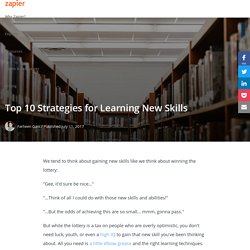
" "…But the odds of achieving this are so small… mmm, gonna pass. " But while the lottery is a tax on people who are overly optimistic, you don't need luck, youth, or even a high IQ to gain that new skill you've been thinking about. All you need is a little elbow grease and the right learning techniques. Whether you want to learn a new subject, gain a new skill, or just enhance the ones you already have, these 10 techniques will give you the framework you need to achieve mastery. Need a little help staying on track with your professional development? 1. Are you a visual learner? As much as we’d like to believe that we learn better in a certain style, the truth is, these have little impact on our ability to learn.
In an intriguing talk at TEDxUWLaCrosse, Dr. Another study was a little more blunt in its judgments: 2. 5 things you should know about how your brain learns. From memorizing calculus equations to learning how to cook the perfect bowl of ramen noodles, there is plenty of learning to be done in college.

To maximize your educational experience, there is one more item you should learn about — your brain! Though learning preferences differ from person to person, all human brains function in the same general way. The First 20 Hours - How to Learn Anything: Josh Kaufman at TEDxCSU. Teaching Learners to be Self-Directed. From Self-Discovery to Learning Agility in Senior Executives by Suzanne Goebel, Richard Baskerville. Suzanne Goebel Georgia State University Richard Baskerville Georgia State UniversitySeptember 20, 2013 Third Annual International Conference on Engaged Management Scholarship, Atlanta, Georgia.
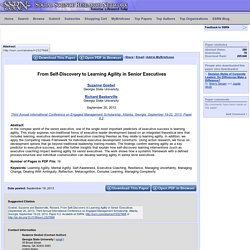
September 19-22, 2013. Abstract: In the complex world of the senior executive, one of the single most important predictors of executive success is learning agility. Number of Pages in PDF File: 19 Keywords: Learning Agility, Mental Agility, Self-Awareness, Executive Coaching, Resilience, Managing Uncertainty, Managing Change, Dealing With Ambiguity, Reflection, Metacognition, Complex Learning, Managing Complexity. The Science Behind How We Learn New Skills.
Beating the Forgetting Curve with Distributed Practice. “If you read the research on how much people forget after training, it’s depressing.
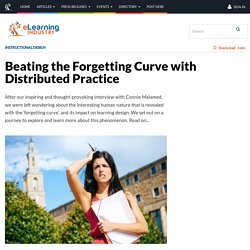
Do a search for the ‘Forgetting Curve’. Once we know something like this, we need to change our approach and educate others.”- Connie Malamed (The eLearning Coach)The above quote is from our interview with Connie Malamed. After our inspiring and thought-provoking interview with Connie Malamed, we were left wondering about the interesting human nature that is revealed with the ‘forgetting curve’, and its impact on learning design. 35 Psychological Tricks To Help You Learn Better. Have you ever considered letting your students listen to hardcore punk while they take their mid-term exam?
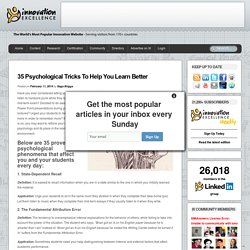
Decided to do away with Power Point presentations during your lectures? Urged your students to memorize more in order to remember more? If the answer is no, you may want to rethink your notions of psychology and its place in the learning environment. The Importance of Learning. Learning What Exactly?: Daniels Pavļuts at TEDxRiga. TEDxDU Ramona Pierson #1. TEDxOaklandUniversity. The 27 Principles to Teaching Yourself Anything (aka The Self-Guided Education Manifesto + PDF download. “I have never let my schooling interfere with my education.” —Mark Twain Note: This post is intentionally long. It’s meant to be our compass for learning the skills that matter in the world and throwing theory out the window. Read it. Save it.
At the end of this post I’ve even provided two free PDF downloads to further guide you towards learning what matters (one is a list of over 30 of the best online resources for creating your own passion-filled curriculum). Enter the Unofficial Self-Guided Education Manifesto… Last week’s article on The Birth of Self-Guided Education caught like wildfire. When that happens, I know a topic deserves some respect. Many of last week’s comments blew my mind.
Living Legends create their own education. The truth of the matter is every Living Legend (whether they dropped out of high school or got a couple PhD’s) took their education and their learning into their own hands. So without further ado… 1. 2. 3. Learning to Risk. Risking to Learn. : Victor Saad at TEDxWindyCity. 15 Surprising Discoveries About Learning. What are some of the most encouraging known facts about learning?
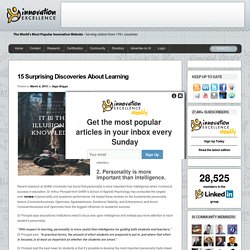
From taking a walk to learning a new language, there are countless things we can do to improve the way we learn. Below we list fifteen steps toward a better brain: 1. Laughter boosts brain function. Pam Schiller and Clarissa A. 2. Recent research at Griffith University has found that personality is more important than intelligence when it comes to success in education. Learning Techniques. One of the things that we expect you to pick up by osmosis, but almost never mention explicitly, is techniques for learning itself.
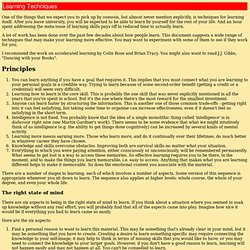
After you leave university, you will be expected to be able to learn by yourself for the rest of your life. And an hour spent addressing the meta-issue of learning skills pays off in reduced time to actually learn. A lot of work has been done over the past few decades about how people learn. This document suggests a wide range of techniques that may make your learning more effective. You may want to experiment with some of them to see if they work for you. Learn Difficult Concepts with the ADEPT Method. After a decade of writing explanations, I’ve simplified the strategy I use to get new concepts to click.
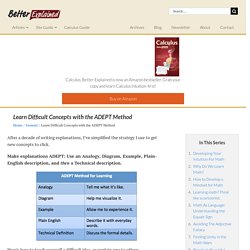
Make explanations ADEPT: Use an Analogy, Diagram, Example, Plain-English description, and then a Technical description. Here’s how to teach yourself a difficult idea, or explain one to others. Analogy: What Else Is It Like? Most new concepts are variations, extensions, or combinations of what we already know. So start there! In our decades of life, we’ve encountered thousands of objects and experiences. Here’s an example: Imaginary numbers. Argh. Ben Dunlap: The life-long learner. A Learning Secret: Don’t Take Notes with a Laptop. “More is better.”
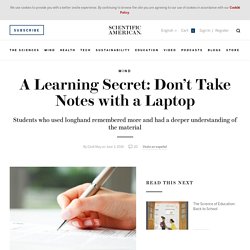
From the number of gigs in a cellular data plan to the horsepower in a pickup truck, this mantra is ubiquitous in American culture. When it comes to college students, the belief that more is better may underlie their widely-held view that laptops in the classroom enhance their academic performance. Laptops do in fact allow students to do more, like engage in online activities and demonstrations, collaborate more easily on papers and projects, access information from the internet, and take more notes.
Indeed, because students can type significantly faster than they can write, those who use laptops in the classroom tend to take more notes than those who write out their notes by hand. Moreover, when students take notes using laptops they tend to take notes verbatim, writing down every last word uttered by their professor. What drives this paradoxical finding? To evaluate this theory, Mueller and Oppenheimer assessed the content of notes taken by hand versus laptop.